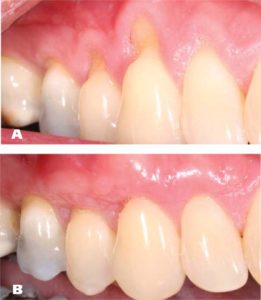“Gum recession is when the margin of the gum tissue surrounding the teeth wears away, or pulls back, exposing more of the tooth, or the tooth’s root.” (Oral B) Sometimes this can happen if someone does take good care of their teeth, you may experience gum recession at some point in your life. It actually affects to some degree the majority of our population. Gum recession can often be a slow process, and one day you may look at your teeth and realize they look “longer.”
Eventually, the surface of the tooth that will be exposed is the root which is made up of dentin. You’ll notice that this layer is a darker yellow than a bright white like the enamel. The dentin layer also has small nerve endings that could be exposed to recession, resulting in sensitivity to hot and cold. This layer of our tooth is also much more prone to decay as it is softer and not as strong as our enamel.
Causes of Recession
- Anatomy/type of tissue
- Irregular tooth position
- Periodontal Disease and plaque along the gumline
- Aggressive brushing
- Trauma
- Chewing Tobacco
- Genetics
- Partial dentures that don’t fit right

Treatment for Recession
If left untreated, recession will continue to increase. Now, while that may be a slow progression the resulting bone loss is irreversible. To prevent furthering recession the cause will need to be determined. In some cases it may be advised that the cause be treated (quitting tobacco, brushing less aggressively, treating periodontal disease etc) and the recession be monitored for any further progression. In other cases a gingival graft may be recommended.
If recession advances to the extent where your dentist believes the teeth are becoming too at risk, you might be advised to pursue a gum graft. This can be done for one tooth or multiple. A graft is when a thin piece of gum tissue is removed from one area in a patient’s mouth and placed at the site of recession. This will protect the exposed root surface from sensitivity and decay.
One of the best things you can do to prevent recession is to be diligent and mindful of your oral health. Maintaining regular hygiene visits with your hygienist and implementing a sound home care routine of brushing 2x/day and flossing daily will greatly decrease the start and progression of recession. As always, if you have questions or areas of concern, please let us know at your next visit!
